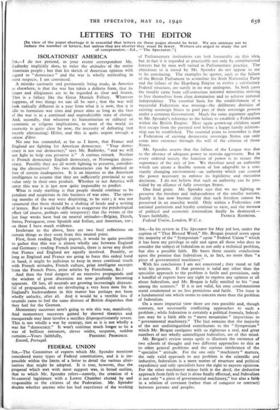LETTERS TO THE EDITOR
[In view of the paper shortage it is essential that letters on these pages should be brief. We are anxious not to reduce the number of letters, but unless they are shorter they must be fewer. Writers are urged to study the art of compression.—Ed., "The Spectator."' ISOLATIONIST AMERICA Ste,—I do not pretend, as your recent correspondent Mr. Radinsky implicitly does, to voice the attitudes of the entire American people ; but that his sketch of American opinion with regard to " democracy " and the war is wholly misleading in most respects, I am convinced.
A mistake curiously and persistently being made, in America as elsewhere, is that the war has taken a definite form, that its issues and allegiances are to be regarded as clear and frozen. This is a fallacy like the Great Munich Fallacy. Whatever happens, of two things we can all be sure ; that the war will look radically different in a year from what it is now, that it is idle to formulate war aims and peace aims as long as the face of the war is in a continual and unpredictable state of change. And, secondly, that whatever its humanitarian or cultural or economic or religous implications, to most of the world its necessity is quite clear by now, the necessity of defeating (not merely eliminating) Hitler, and this is quite urgent enough a raison d'être.
No one has contended, as far. as I know, that France and England are fighting for American democracy. "Your demo- cracy is not our democracy," says Mr. Radinsky, "and we will not fight to help you preserve it." A curious remark. Neither is French democracy English democracy, or Norwegian demo- cracy. Possibly they are all worth fighting to preserve, consider- ing the alternative? No two democracies can be identical or free of certain inadequacies. It is an injustice to the American intelligence to assume that they are sufficiently provincial to see value only in their own product. Whether or not America will enter this war it is just now quite impossible to predict.
What is truly startling is that people should continue to be petulant and suspicious in this business of war aims. The open- ing months of the war were dispiriting, to be sure ; it was not unnatural that there should be a shaking of heads and a writing of letters. But it would be difficult to exaggerate the psychological effect (of course, perhaps only temporary) that the events of the last four weeks have had on neutral attitudes—Belgian, Dutch, Swiss, Portuguese, even Spanish and Italian, and American, too ; on these I have much evidence.
Irrelevant to the above, here are two final reflections on certain things as they seem from this neutral point.
First, from reading English papers, it would be quite possible to gather that this war is almost wholly one between England and Germany ; reading French journals, there is never any doubt that France and England are equally involved. Possibly, as long as England and France are going to force this ordeal hand in hand, it might be judicious to keep in more continual touch with French attitudes, French culture, print intelligent excerpts from the French Press, print articles by Frenchmen, &c.?
And then the fatal dangers of an excessive propaganda and the wisdom of great discretion are now gradually becoming apparent. Of late, all neutrals are growing increasingly distrust- ful of propaganda, and are developing a very keen nose for it. England's backwardness in this matter has perhaps not been wholly unlucky, after all. And it would be a terrible loss if neutrals came to feel the same distrust of British dispatches that they feel for the German.
Momentary successes aren't going to win this war, manifestly. And momentary successes gained by shrewd theatrics and masquerade may later involve a sacrifice disproportionately severe. This is not wholly a war by strategy, just as it is not wholly a war for "democracy." It won't continue much longer to be a war of brilliant entrances, clever asides, suspenie, sudden






























 Previous page
Previous page